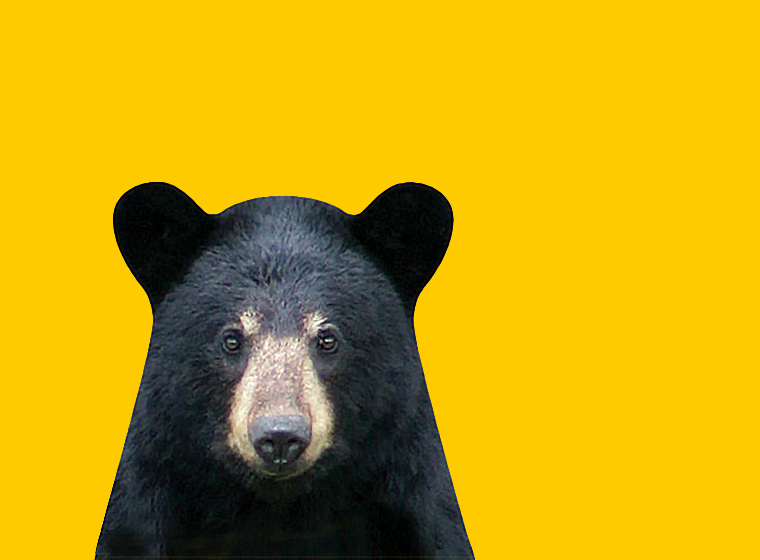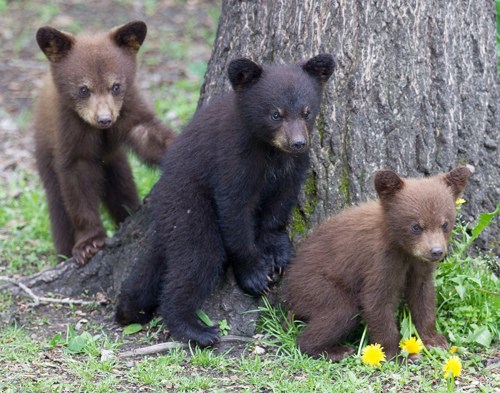Who to contact
Not every bear sighting is an emergency situation. Here is who to call if you encounter a bear.
Emergency situations
Call 911 or your local police if a bear poses an immediate threat to personal safety and exhibits threatening or aggressive behaviour, such as:
- enters a school yard when school is in session
- stalks people and lingers at the site
- enters or tries to enter a residence
- wanders into a public gathering
- kills livestock/pets and lingers at the site
Police will respond first to an emergency situation, but may request assistance from the ministry during daylight hours.
Non-emergency encounters
Call the toll-free Bear Wise reporting line at
- roams around or checks garbage cans
- breaks into a shed where garbage or food is stored
- is in a tree
- pulls down a bird feeder or knocks over a barbecue
- moves through a backyard or field but does not linger
This line operates 24 hours a day, seven days a week, from April 1 to November 30.
If you encounter a black bear
Stop. Do not panic. Remain calm.
Generally, the noisier the bear is, the less dangerous it is, provided you do not approach. The noise is meant to “scare” you off and acts as a warning signal.
Do
- Slowly back away while keeping the bear in sight and wait for it to leave.
- Throw objects, wave your arms and make noise with a whistle, air horn or yelling if the bear does not leave.
- Prepare to use bear spray.
- Get inside a building or vehicle, if you are nearby, as a precaution.
- Drop any food you may be carrying and slowly move away.
- Leave a bear alone if it is in a tree. Leave the area. The bear will come down when it feels safe.
- Play dead only if you encounter a mother bear with cubs.
Do not
- Run, climb a tree or swim.
- Kneel down.
- Make direct eye contact.
- Approach the bear to get a better look.
- Attempt to feed a bear.
- Let your dog off its leash.
- Play dead unless you are attacked by a mother bear defending her cubs.
If a bear attacks
- Use bear spray and immediately leave the area.
- Fight back with everything you have.
- Do not play dead unless you are sure you are being attacked by a mother bear defending her cubs.
If you own a dog
Keep your dog on a leash when out in bear country. Be aware that unleashed dogs can cause defensive black bear attacks on people. Unleashed dogs returning to their owners can cause a chase response that may lead a bear back to the owner. Take these precautions with your dog:
- leash your dog(s) to reduce the potential of dogs harassing a black bear or of being attacked by one
- check your yards for the presence of a black bear before letting your dogs out and keep an eye on them while they are in the yard
- manage your own safety first
- if you encounter a bear, remove yourself and your pet from the area as soon as you can do so safely
Bear fact:
Unleashed dogs can surprise bears and cause a defensive attack on dogs and their owners. Always keep your dog on a leash. To avoid attracting bears, do not leave dog food outdoors, in screened-in areas or porches. Mother bears with cubs will normally avoid interacting with humans.
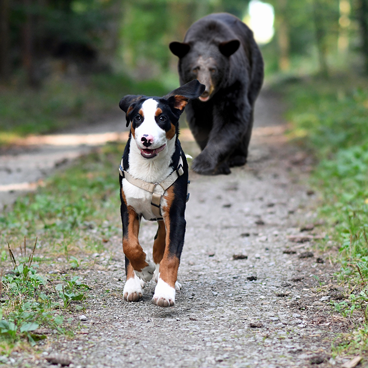
When out in bear country
Bears are smart, curious, powerful and potentially dangerous. They do not like surprises. If you are a hiker, cyclist, jogger, berry picker or you plan to spend some time outdoors in bear country, learn to be Bear Wise to avoid an encounter.
A surprised black bear will give off warning signs to let you know you are too close. For example, a black bear standing on its hind legs is not a sign of aggressive behaviour. The bear is trying to get a better look at you or catch your scent. Unleashed dogs can make these situations more dangerous. Always keep your dog on a leash when out in bear country.
Alert bears to your presence so they can avoid you. Make noise such as singing, whistling or talking while you are in areas with restricted visibility or with high background noise, such as near streams, waterfalls or on windy days.
Bear fact:
Cubs typically stay with their mother bear for 1.5 years. If you see a cub or small bear, there is a good chance that the mother is nearby. Take caution.
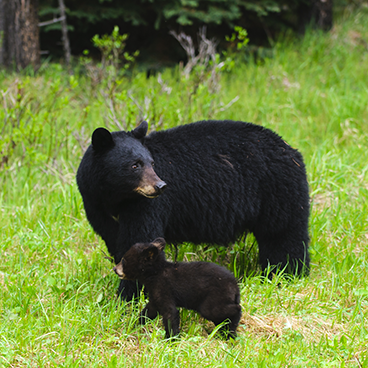
Bear warning signs
There are two types of warning behaviours that you may experience during a bear encounter.
A defensive bear
When bears are surprised, they can become stressed. They usually just want to flee. In some cases, bears may become defensive. Female bears with cubs present tend to be more aggressive in defence of their cubs and should be treated with extra caution.
A bear that feels threatened will:
- salivate excessively and exhale loudly
- make huffing, moaning, clacking and popping sounds with its mouth, teeth and jaws
- lower its head with its ears drawn back while facing you
- charge forward, and/or swat the ground with its paws (known as a ‘bluff’ charge)
A predatory bear
A bear that is predatory:
- will approach silently and persistently, usually in rural or remote areas
- may continue to approach regardless of your attempts to deter them by yelling or throwing rocks
- may retreat if bear spray is effectively deployed but will return and continue to approach. If you successfully deployed bear spray, immediately leave the area
After the bear leaves
- Report the bear encounter by calling
1-866-514-2327 or TTY705-945-7641 . - Tell your neighbours about bear activity in the area.
- If the bear was eating non-natural food (such as garbage or bird food), remove or secure the item.
When to use self-defence
If you have tried everything possible to get a bear to leave your property and you are afraid for your safety, you have the right to protect yourself and your property.
Killing a bear in self-defence must be an action of last resort.
Any action you take must be done:
- according to applicable laws (for example, local discharging a firearm by-laws)
- safely
- in the most humane way possible
You do not need a hunting licence to kill a bear in self-defence, however:
- If you kill a bear and do not intend to keep it, report it immediately to your local ministry office.
- If you kill a bear and want to keep it, you must register for a Notice of Possession immediately with the ministry.
Bear Wise tips and tools
Learn how to be Bear Wise while outdoors, at your home, cottage, school, business or farm.
About black bears
Black bears live throughout most of Ontario. They primarily inhabit forested areas where they are best able to find food, refuge and den sites.
Black bears are born in their dens in January and remain in hibernation with their mother until spring (around April). At this time, cubs are usually up to 10 pounds, about the size of a house cat.
Cubs will quickly put on weight. They can grow up to 60 pounds by the time they go into hibernation their first full winter. Despite how quickly they grow, cubs will stay with their mothers for a second winter and will only venture off on their own the following summer when they are 17-18 months old for mating season (around June).
When fully grown:
- female black bears can weigh up to 300 pounds, but on average weigh 140 pounds
- male black bears can weigh up to 500 pounds, but on average weigh 200-250 pounds
Black bear sizes will vary greatly year over year and depend on the availability of natural foods.
Eating habits and diet
Bears' entire life revolves around food. When they are not hibernating, bears spend most of their time looking for food.
From the time they come out of hibernation until berry crops are available, bears live off their stored fat and the limited energy provided by fresh spring greens. Although they are formally classified as carnivores, meaning they mostly eat meat, their diet is truly omnivorous, meaning they eat both plants and animals. They get most of their food energy by feeding on summer berry crops like blueberries, raspberries, and cherries. In the fall, they turn their attention to hazel nuts, mountain ash, acorns and beech nuts.
Though black bears will eat carrion, insects, fish, deer fawns and moose calves, the bulk of their diet is plant material. Their natural preference is to find lots of high energy food, like berry patches, that will help them fatten up fast. Their survival and ability to have and raise young depend on their ability to put on weight before going into winter hibernation. The availability of their natural food varies from season to season and from year to year and will affect their reproduction rate.
Bear reports in Ontario
When there is a lot of natural foods available, the number of reported bear sightings are lower. When natural food sources are scarce, reported sightings are higher because black bears will look for alternative food sources, sometimes in urban or developed areas.
Bear fact:
Bears need 20,000 calories a day to prepare for hibernation— that’s 78 pounds of blueberries, 672 acorns, nearly 25,000 tent caterpillars or one seven-pound birdfeeder filled with black oil sunflower seed.
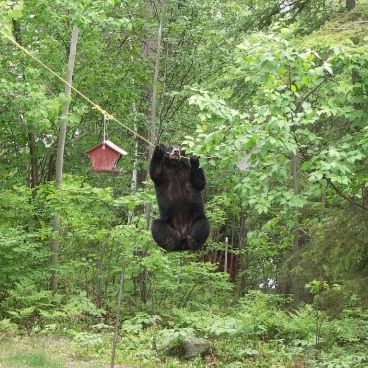
Take community action
It takes the local community to prevent conflicts with bears. You may be doing your part, but if your neighbour is not, you may still encounter a bear on your property as a result.
Commit your community to becoming Bear Wise. Remind your neighbours to do their part by:
- sharing Bear Wise tips with your neighbours
- starting a conversation about how you can work together to prevent conflicts with bears (for example, make sure the whole street waits until morning to put out garbage for collection)
